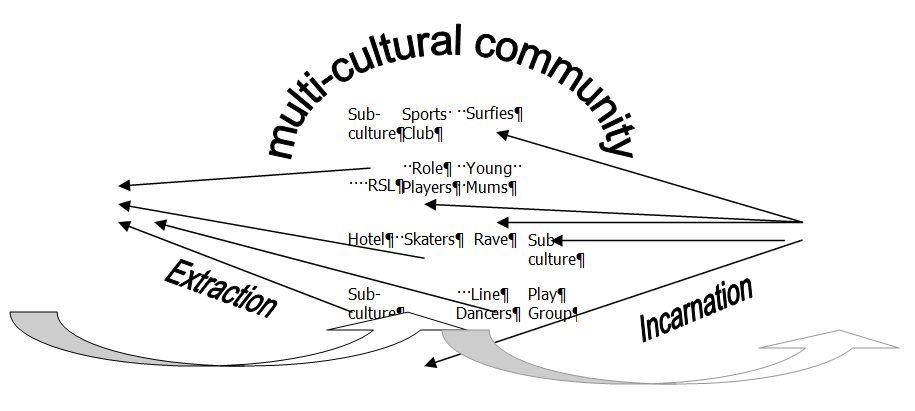|
The 21st Century Church: Extraction or
Incarnation?
by Major Daryl Crowden
With the haunting prophecy ringing in his ears,
Ray Kinsella cranked over the tractor and prepared to mow down
his precious cornfield. His passion was baseball; his dream
was to watch his heroes run the diamond once again. So it was
that he found himself driven to the seemingly ridiculous idea
of building a baseball diamond in the middle of a cornfield in
Iowa, all because a voice insisted, “if you build it they will
come.” (Field of Dreams, Universal Studios. 1989) And they
did!
The movie, starring Kevin Costner, is about never giving up on
your dreams, in spite of ridicule and hardship, but a sub-plot
could also remind us of a current (and historical) community
growth principle.
History shows that traditionally the church has raised its
buildings on the high point in town, at the end of Main
Street, or on a vantage point at the top of the hill. The
building was made to be impressive and the spire (or
telecommunications tower) with the cross on top was visible
from all angles. The theory was that, like a traction beam
emanating from the USS Enterprise, people will be drawn into
the warm fellowship of the church where they will become
involved in programs and church functions – and because of the
overwhelming attraction of church and God they will remain. We
have built it, and they will come!
Attraction Evangelism was the dominant form of evangelism in
the era history has called Christendom, when by default all
people were Christian unless they selected another option. And
for the most part this Attraction theory worked. The church of
the Middle Ages through to the early twentieth century did
attract the crowds; it was the centre of town life, the
champion of justice and the reminder of morality.
Two world wars and numerous other ‘military actions’ have
changed our world. A world of independent and exclusive
nations has become a global village where interdependence has
drawn us together into a melting pot of multiculturalism.
Christendom is no longer the default setting; to suggest such
a thing is to insult our global partners and neighbours. The
world has changed but the church remains solid. In many issues
this is essential: the goal remain the same, the message must
not change, the Rule Book (Scriptures) remains foundational,
but the language has become outdated. We must learn to speak
the language of our culture. Attraction evangelism by
Extraction will not grow the church of the twenty-first
century; it will not even preserve the church in plateau.
Our theology has been one of making forays into the community
at large where we introduce people to Christ with the
intention of dragging them into the church so that they can be
‘real Christians’; after all that’s the Scriptural mandate:
“Let us not give up meeting together, as some are in the habit
of doing”. (Hebrews 10:25) We extract them from their culture
and demand that they adopt our culture, (with all its unique
rites of passage) leaving behind any ‘unsavoury’ aspects of
their culture that we deem incompatible with our Christian
culture (or should that be Church traditions?).
Attraction by Extraction is not just the way it was! As I
listen to church leaders and members bemoaning the lack of
growth in their congregations it smacks of this prevalent
concept of church growth. I hear words like, “if we run the
right programme the people will come to the church and then
we’ll work out how to keep them here.”
Attracting people is not the problem. The issue is what is the
locus of attraction? Are we trying to attract people to the
safe, comfortable and predictable church culture that we know
and understand, a culture (fortress, citadel) that we have
protected from all unchristian influences? Or are we
attracting people to the unpredictable, sometimes
incomprehensible God who created the wonderfully bright mosaic
of unique cultures and who delights in the fact that we are
all “fearfully and wonderfully made” (Psalms 139:14)? Does the
church reflect this divine mosaic or can you see it as
universally similar and boring?
I’m not suggesting that the institution of church is wrong, or
outdated. I’m not even suggesting that we shouldn’t continue
to do all we can to attract people to our churches, (there
will always be people for whom church culture is meaningful
and uplifting) but I am suggesting that extraction is not the
best way to grow the Community of God. In fact I don’t believe
it was ever the best way, nor is it the way the early church
grew.
Jesus didn’t raise a tent on the Mount of Olives and advertise
a healing service to attract people to him – he went to them.
He entered into their culture and requested that ‘converts’
return to their community and share their story in their own
language (Mark 5:18-20; Matthew 9:1-6). This is called
Incarnation.
Incarnation is more than the theological term used to describe
the mystery of God taking on human form and living amongst us.
Incarnation is also the word that describes the way in which
the church is to impact the world. Incarnation is a life
choice for the purpose of becoming an insider. I first saw
this in action when I heard my parents (missionaries in Sri
Lanka) being introduced by the indigenous people as “one of
us, they are just like us”. It is being typical or
representative of the culture or community. And it is the way
the church began!
Attraction, to God, by Incarnation is the Jesus Model!
Attraction by Incarnation is the way that the Community of God
will expand in the twenty-first century and beyond.
Incarnation demands that we leave the safety, comfort and
predictability of our churches and share in the life of the
community, or culture that we are wanting to impact. We will
need to take the priority of church growth and place it more
firmly on kingdom growth.
The measure of ‘success’ has usually been the statistical
growth of those attending a church function; this is
traditionally what we mean by church growth. However, this is
only an indicator of the success that you have at cultural
conversion. Church growth statistics do not measure the
impact, or influence you are having for Christ in your
community, this growth is far more intangible and
unpredictable – but this is kingdom growth.
The emphasis today needs to be upon Attraction to God, by
Incarnation rather than by Extraction. This will look
different to what we know and love, and at times it will be
unmeasurable in finite terms. It will take a variety of forms
in different cultures, but it will always be contextual.
It may mean that instead of planning and developing a church
based playgroup that you encourage your young mums and babies
to join an existing community playgroup, where they can
develop relationships and influence other mums for Christ. Not
for the purpose of bringing them to church, but with the aim
of birthing an indigenous faith community in the playgroup –
communion and worship happens in their comfort zone, not
yours.



Church could look like the social room of the
local sports club on a Saturday afternoon where a group of
your church people have played a game and now sit sharing a
drink with the locals, influencing them for God in their
language. Not for the purpose of extracting them from the
social room to the church, but with the intention of expanding
the Community of God in their sub-culture.
Worship could be a group of Ferals in a dimly lit rave club,
dancing and singing, being in the rave but glorifying a
different God, and on some kind of natural (or supernatural)
high that leads other ravers to ask, “What are you on? Can I
get some?” They asked! “The high is Jesus!” And in that inner
city rave club a faith community is developing. Surely Jesus
wouldn’t dance with people like that?
If the church is to fulfil Jesus’ commission to “make
disciples of all nations [cultures]” (Matthew 28:19) then it
is going to happen outside the four walls of the existing
church structure. It is going to be done by Christians
attracting others to God by their willingness to be in the
world but not of the world (1 John 2:15). It is going to
happen as Christians become incarnate in their ministry and
willing to sacrifice the comfortable known and take on the
uncomfortable unknown.
Jesus is attractive to the world because of his incarnation,
because he was willing to ‘live as one of us’, to meet people
in their context and to offer them God within their culture.
If the church is to reflect its God then we too must become
attractive by our incarnation.

Extraction: We go in to ‘rescue’ them
and bring them out to the safety of church!
Incarnation: We go in to be ‘one of them’ and by
relationship develop communities of faith within the
sub-cultures. Some of these will come to the church, but this
is not the sole aim of going in.
|